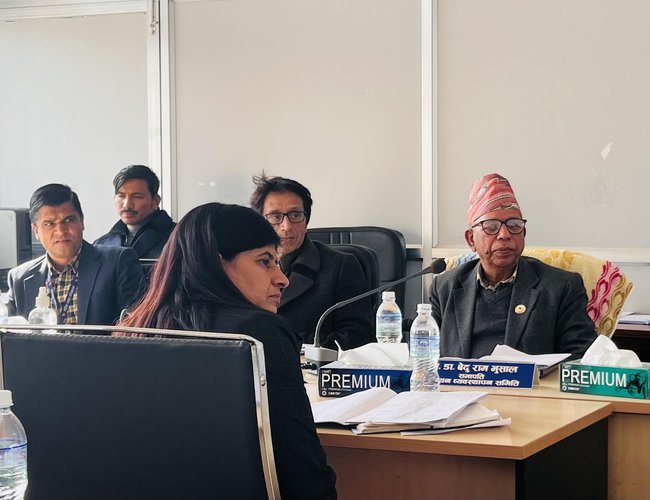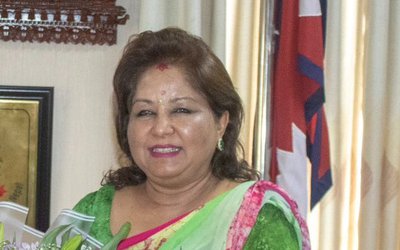
The Legislative Affairs Committee of the National Assembly of Nepalese Parliament is currently reviewing the University of Nepal Bill 2079, which was approved by the former Prime Minister Sher Bahadur Deuba'cabinet before the November 2023 general elections.
While the Bill is now being considered by the Legislative Affairs Committee, the University of Nepal Infrastructure Development Board established by the government in 2021 is currently developing the academic programs, acquiring land, generating funds, and planning the infrastructure for the proposed university, which is expected to be located in the Nawalparasi district of Nepal.
The University of Nepal is expected to be a high-quality modern university with top-notch faculty, the state-of-the-art technology and research facilities, including laboratories, libraries, and other resources that support research and innovation, flexible curriculum, interdisciplinary options that combine different fields of study, diversity and inclusivity, and community engagement.
As a modern university, with liberal arts and sciences approach, it will be engaged with its community, working to address social and economic issues, and collaborating with local businesses, organizations, and institutions to support regional development and growth. The University of Nepal will also provide career support to students, including internships, networking opportunities, and job placement services, to ensure that graduates are well-prepared for the job market and have successful careers.
Some members of the Legislative Affairs Committee have interacted with the University of Nepal Infrastructure Development Board to discuss the proposed university and the draft legislation. The Committee has also visited Nawalparasi and observed the proposed university sites while speaking with the concerned 'palikas' who have joined hands with the promoters in establishing the university.
According to Dr. Bipin Adhikari, one of the members of the Board, there are several factors that have contributed to the challenges facing university education in Nepal. Universities in Nepal often suffer from a lack of funding, which can lead to insufficient resources for research, teaching, and infrastructure development. There is limited opportunities for professional growth of the faculty members, including low salaries, a lack of research funding, and limited opportunities for professional development. Many talented students and faculty members leave Nepal to pursue higher education and career opportunities abroad, leading to a brain drain that weakens the higher education sector.
Adhikari also thinks that most universities in Nepal are heavily dependent on government funding and are subject to significant government oversight, which have limited their autonomy and flexibility. Due to political instability for many years, it has been difficult to establish a stable and consistent policy framework for higher education.Some universities suffer from a lack of quality teachers who are properly trained and motivated to teach.
Dr. Adhikari also pointed out that addressing these challenges will require significant reforms to the higher education sector in Nepal, including increased funding, stable policy frameworks, greater autonomy for universities, and more opportunities for professional growth and development for the faculty and staff members.
During the deliberations on the Bill, almost all members of the Legislative Affairs Committee expressed their views and interacted with the Chairperson, Dr Arjun Karki, and his team from the University of Nepal Infrastructure Development Board.
The members who provided comments include Dr. Khim Lal Devkota, Taraman Swar, Devendra Dahal, Bhagvati Neupane, Ganga KumariBelbase, Udaya Bahadur Bohara, Jitendra Dev, and Anita Devkota. Some of them have questioned the need for a new university and suggested focusing on improving the existing ones that have not been able to deliver.
The proposed University of Nepal is expected to address the challenges in the education sector in Nepal and serve as a model. A decent legislative framework is thus necessary to establish a new university because it will provide a legal foundation and regulatory framework for the establishment, operation, and management of the university.
A well-designed legislative framework can ensure that the new university operates efficiently and effectively, and provides high-quality education that meets the needs of its students and the broader community.A good legislative framework can protect the academic freedom and autonomy of the university, ensuring that it has the flexibility and resources it needs to fulfill its educational mission.
The complete legislative shape of the University will only become clear after the members of the Legislative Affairs Committee complete clause-by-clause discussions on the University of Nepal Bill 2079 and dispose of all amendment proposals tabled by the members of the National Assembly on the original Bill in the past.
- The Sentiment Of Monetary Policy Seems Focused On Increasing Eemand: FNCCI President Chandra Prasad Dhakal
- Jul 26, 2024
- Monetary Policy 081/82 Is Making The Economy More Dynamic: Governor Adhikari
- Jul 26, 2024
- Global IME Bank And Shashila Motors Signed Agreement Regarding Electric Vehicle loan
- Jul 26, 2024
- Lok Bahadur Thapa, permanent representative of the UN in New York, was appointed as the Vice President of ECOSOC
- Jul 26, 2024
- Leeladevi Gadtaula Became The First woman Chief Secretary
- Jul 26, 2024
















